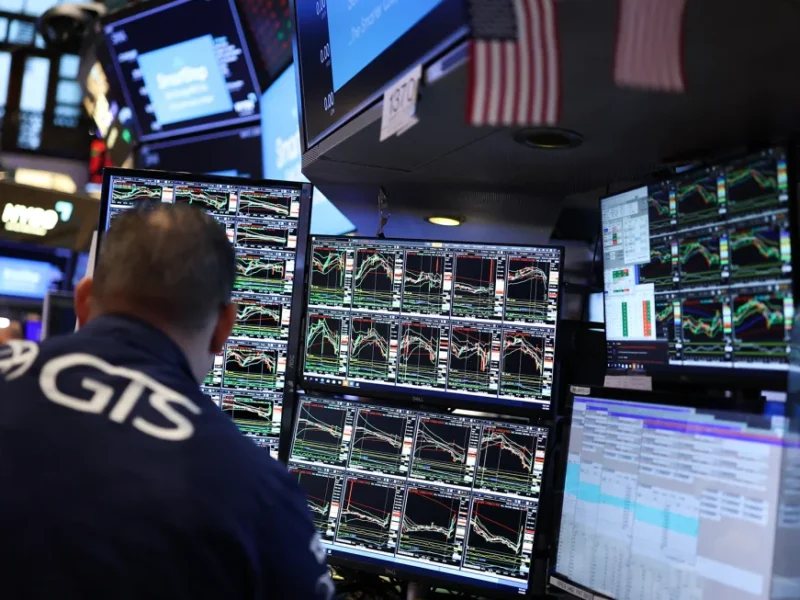Global markets were severely shaken on Thursday following President Donald Trump’s historic tariff announcement, which raised concerns about a potential global recession.
The Dow dropped 1,679 points, or 3.98%, while the broader S&P 500 fell by 4.84%, and the Nasdaq plunged 5.97%. All three major indexes saw their largest single-day declines since 2020.
International markets also experienced significant losses. Europe’s STOXX 600 index dropped 2.57%, erasing its gains since January. Germany’s DAX index fell 3%, France’s benchmark index declined 3.31%, marking its largest drop since July 2023, and Italy’s index slid 3.6%, its biggest decline since March 2023. In Asia, Japan’s Nikkei 225 dropped 2.77%, and Hong Kong’s Hang Seng index fell 1.52%.
These sharp declines followed Trump’s announcement of substantial tariffs on almost all imports into the United States, sparking fears of potential retaliation from trading partners and destabilizing the global economy.
As a result, the US dollar fell to its weakest level since October, reversing its post-re-election gains. Despite the typical expectation that tariffs would strengthen the dollar, investor concerns about the long-term negative impact of these policies led to a sharp decline in the currency. Michael Block, a market strategist at Third Seven Capital, likened the policy to a self-destructive act, stating it disregarded basic economic principles.
Bond yields dropped significantly following the announcement, continuing their decline on Thursday. The yield on the 10-year Treasury note fell to 4.05%, its lowest level since October, as investors sought safer assets. Chip Hughey of Truist Advisory Services noted that concerns about the economic drag from policy uncertainty and stricter tariffs drove this flight to bonds.
Gold prices surged to a record high above $3,160 per troy ounce on Wednesday, maintaining their value above $3,100 on Thursday. The metal has risen 19% this year, marking its best quarter since 1986.
The S&P 500 closed in correction territory, down 12.17% from its February peak. The Nasdaq, already in correction, closed 17.96% below its December high, while the Dow finished 9.93% lower than its December record, nearing correction territory.
The White House dismisses market declines.
White House Press Secretary Karoline Leavitt attempted to ease investor concerns during a CNN interview on Thursday regarding President Donald Trump’s decision to impose tariffs of at least 10% on all countries.
“To anyone on Wall Street this morning, I would say trust in President Trump,” Leavitt stated. “This is a president who is reaffirming his proven economic approach from his first term.”
Stocks that were heavily impacted included those of companies dependent on international supply chains, now facing tariffs. Apple (AAPL) dropped 9.3%, Nike (NKE) fell 14.4%, Best Buy (BBY) plummeted 17.8%, and Ralph Lauren (RL) declined 16.3%.
Apple lost over $310 billion in market value from Wednesday’s market close to Thursday’s close, according to FactSet data.
Wall Street’s volatility index, the Cboe Volatility Index (VIX), spiked 39.6% on Thursday. “Extreme fear” dominated market sentiment, reflected in CNN’s Fear and Greed Index, which dropped to its lowest level of the year as tariff concerns unsettled investors.
President Trump dismissed the market reaction to his tariff announcement on Thursday, telling reporters at the White House, “I think it’s going very well.”
“The markets are going to boom, the stock is going to boom, the country is going to boom,” Trump declared on the South Lawn. “And the rest of the world wants to see if they can strike a deal. They’ve taken advantage of us for many, many years. For years, we’ve been on the wrong side, and I believe it’s going to be incredible.”
Concerns about a recession.
JPMorgan analysts warned that if President Trump maintains the massive tariffs he announced on Wednesday, his trade policies could lead both the US and global economies into a recession by 2025.
This conclusion is not unexpected, as JPMorgan had previously given the US economy a 40% chance of entering a recession before Trump’s announcement. The analysts noted that the tariffs would increase taxes on Americans by $660 billion annually, marking the largest tax hike in recent memory. The tariffs would also drive up prices, contributing an additional 2% to the Consumer Price Index, which tracks inflation in the US.
“The impact on inflation will be substantial,” the analysts said, describing the full implementation of these policies as a major macroeconomic shock.
The recession risks would be worsened by declining consumer and business sentiment, along with potential retaliatory tariffs from foreign nations.
“We emphasize that if these policies persist, they are likely to push both the US and global economies into recession this year,” the analysts added.
Oil prices dropped sharply on Thursday due to concerns that Trump’s trade war could slow the global economy and that OPEC might be oversupplying the market. US oil futures closed at $66.95 per barrel, down 6.6%, marking the biggest single-day decline since July 2022. Brent crude, the global benchmark, fell 6.4%, its largest one-day drop since August 2022, finishing the day at $70.14 per barrel.
Additionally, OPEC+ surprised markets on Thursday by announcing that Saudi Arabia, Russia, and six other members would begin accelerating previously planned production increases starting in May.
Businesses prepare for the consequences.
The Business Roundtable, a prominent group of leading US CEOs, expressed concerns on Wednesday night that President Trump’s latest tariffs could harm their businesses.
“Universal tariffs ranging from 10-50% risk causing significant damage to American manufacturers, workers, families, and exporters,” said Joshua Bolten, CEO of the Business Roundtable, in a statement. “The longer the tariffs remain in place, the more damage will be inflicted on the US economy, potentially worsened by retaliatory actions.”
According to Fitch Ratings, Trump’s new tariffs would significantly raise the US tariff rate to levels not seen since around 1910. The tariffs would push the US rate from 2.5% last year to 22%, according to Fitch. This exceeds the 20% tariff rate imposed after the Smoot-Hawley Tariff Act of 1930, which triggered a global trade war and worsened the Great Depression, according to economists.
“This is a game changer, not just for the US economy, but for the global economy,” said Olu Sonola, head of US economic research at Fitch Ratings.
Sonola predicted that many countries could slip into recession, adding, “You can throw most forecasts out the door if this tariff rate persists for an extended period.”











